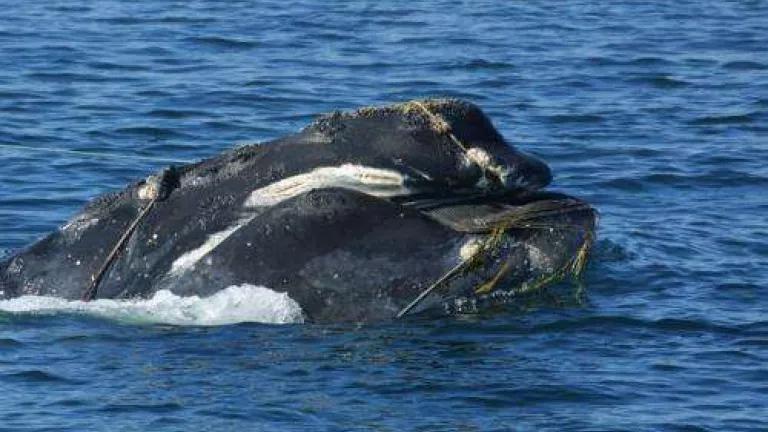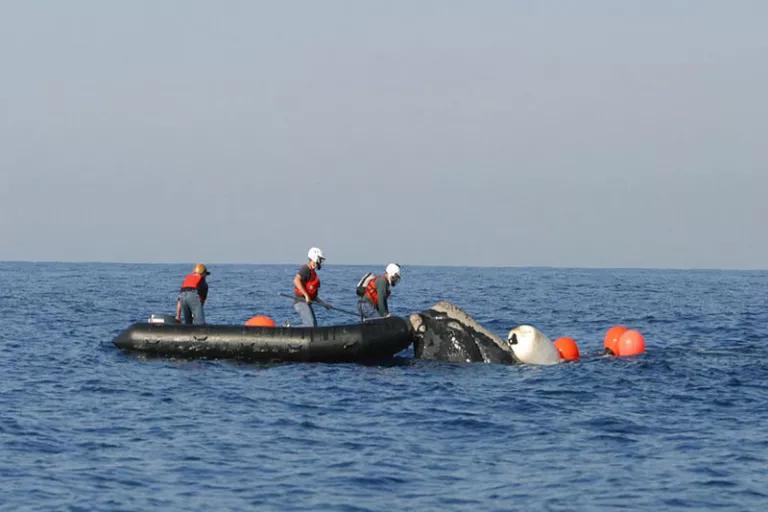
“If we don’t take immediate action, the storied North Atlantic right whale could go extinct in our lifetime,” Senator Cory Booker said while introducing The SAVE Right Whales Act of 2018 (S. 3038). “We have a responsibility to find and implement solutions that will help protect endangered species for generations to come.”
U.S. Senators Cory Booker (D-NJ), Tom Carper (D-DE), and Bill Nelson (D-FL), along with Senators Bob Menendez (D-NJ) and Kirsten Gillibrand (D-NY) introduced the bill on World Oceans Day to protect the highly endangered North Atlantic right whale. Senator Ed Markey (D-MA) has also since shown his support. Rep. Seth Moulton (D-MA), along with Reps. Raul Grijalva (D-AZ), Jared Huffman (D-CA), and Bill Keating (D-MA), have introduced a companion measure in the House of Representatives (H.R. 6060). NRDC has endorsed the bill.
This action by Congress has come not a moment too soon for the North Atlantic right whale, which continues its alarming decline. If current numbers of deaths continue, we may lose these incredible animals within twenty years.
What the whales need most is a rapid and targeted effort to transition to “buoyless” fishing gear. This would remove thousands of thick ropes stretching from pots and traps on the seafloor to buoys at the water’s surface. Entanglement in these ropes is the leading cause of death for North Atlantic right whales and 83 percent of animals show scars from entanglement.
Upon becoming entangled, whales may drown almost immediately if they are unable to reach the surface to breathe. Those still able to swim suffer serious injuries as the ropes cut deeply into their skin and mouths over time. Others slowly starve to death due to the additional energy expenditure needed to drag heavy fishing gear around. Even if they escape the gear, the stress of being entangled can prevent females from having calves for years afterwards.
The SAVE Right Whales Act of 2018, if it becomes law, would provide $5 million per year over ten years (2018-2028) in federal funds for conservation programs aimed at rebuilding a healthy population of North Atlantic right whales. Critically, the Act focuses on funding projects intended to develop, test, or use innovative technology or other methods to reduce lethal or sublethal effects of entanglements in fishing gear and vessel collisions, the second leading cause of North Atlantic right whale death.
“The waters off Massachusetts are home to one of the planet’s most endangered species, the right whale,” said Rep. Seth Moulton. “By providing competitive grants for right whale conservation projects, we can generate innovative solutions for saving an entire species. Let’s preserve some of earth’s greatest animals for future generations, rather than be a generation responsible for their irreversible demise.”
Proposals that promote cooperative projects on such topics with other foreign governments, affected local communities, small businesses such as fishermen, others in the private sector, or nongovernmental organizations, will also be prioritized for funding. As many whale entanglements occur in Canadian waters, transboundary collaboration will be essential if a transition to buoyless gear is to be successful.

While the Act marks an important signal from Congress of their commitment to save our North Atlantic right whales, this is just the start of what will be a long road ahead. Political will needs to swiftly be translated into action if the North Atlantic right is to survive. Through the tragic story of the vaquita, we’ve witnessed how quickly hope can be lost when conservation efforts, even if significant, come too late.
The first critical step is to garner broad support from other members of Congress so that the bill is signed into law. NRDC will be on the front line in the coming weeks working to ensure the Act’s success, so stay tuned for updates!
We are at a pivotal point in the story of the North Atlantic right whale. We can save them, if we decide to do it now.
You can help take action by calling on your representatives to support the current actions being taken by Congress. If your representative is already leading on this issue, you could show your appreciation by sending a quick note of thanks.
You can find your Congressional representative's contact information here.

